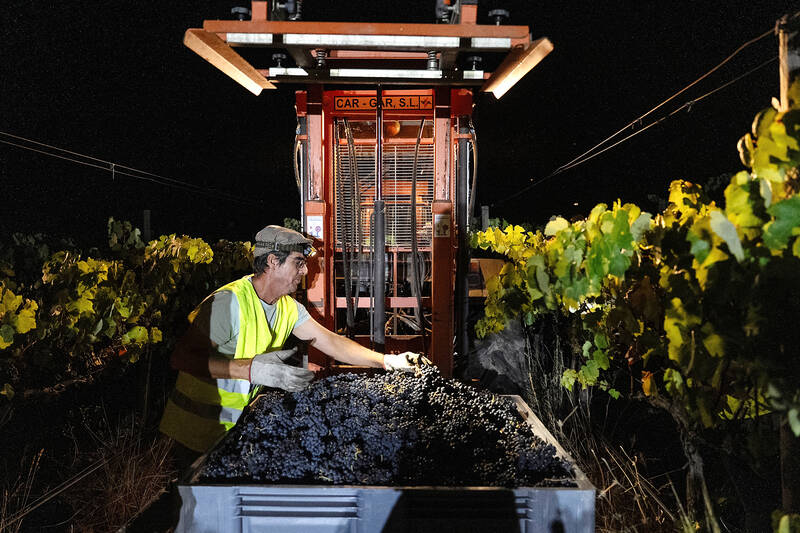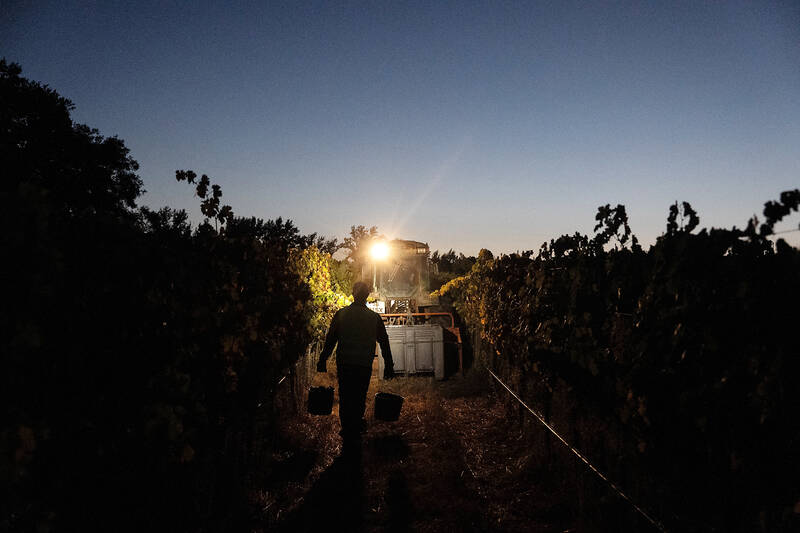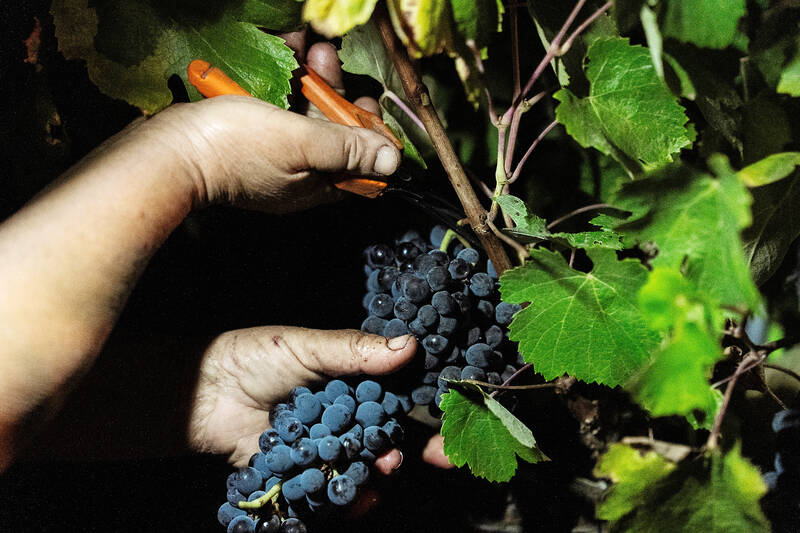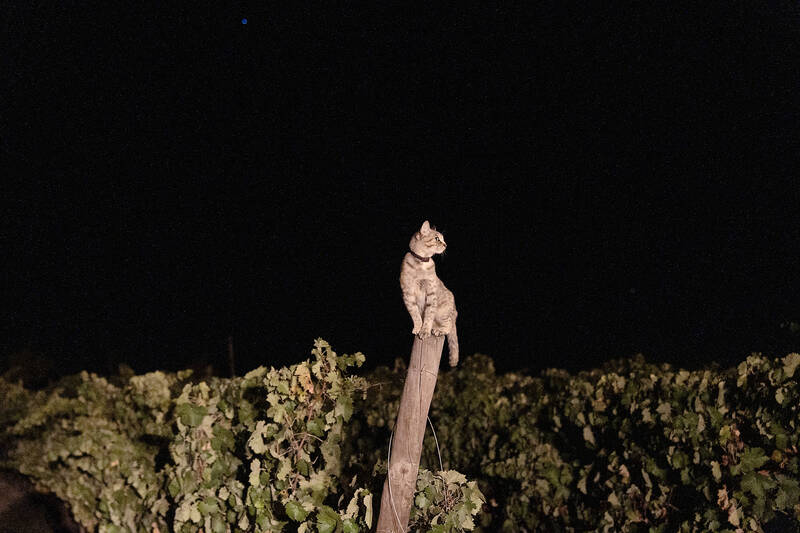Under a moonlit sky and the glow of headlamps, workers gingerly pluck grape clusters while much of Portugal sleeps.
They harvest in the Alentejo region, sometimes called the “Tuscany of Portugal” for its rolling vineyards, olive groves and forests that supply cork for the wines. In this vineyard about a 90-minute drive east of Lisbon, the cool autumn night carries the smell of ripe fruit. The workers’ laughter blends with the sound of rustling leaves.
The night harvest is a time-honored practice in viticulture, meant to preserve the freshness of grapes and shield them from the adverse effects of daytime heat, sunlight and oxidation. As summers in Portugal grow longer, hotter and more unpredictable — in part due to climate change — the practice has become more common here.

Photo: AP
Barbara Monteiro, co-owner and manager of the Herdade Da Fonte Santa vineyard said she struggled at first to convince her harvesters to work at night — midnight to 8am. They began doing so in 2019.
“Today, we can say they actually prefer this schedule, as they can often work almost another day, enjoy the day, and avoid the extreme heat we often experience here,” she said.
The wine harvest in Spain, Italy and Portugal generally takes place between late August and October, with variations based on the region, type of grapes and weather conditions.

Photo: AP
Some vineyards have been harvesting at night for years. In parts of Italy, others have for more than a decade. The El Coto de Rioja vineyard in Spain’s famed La Rioja region opts for early morning harvests, beginning at 5am or 6am, according to Cesar Fernandez, the vineyard’s technical director and winemaker.
In Portugal’s Alentejo region, daytime temperatures particularly in August can reach 40 Celsius. At night, they can drop by as much as 20 Celsius or more.
Grapes are naturally sensitive to temperature shifts. Warmer weather can make them reach sugar maturity before developing a full flavor and ripeness, leading to higher alcohol levels but less complex wines. Intense heat also speeds up acid loss and can trigger early fermentation as wild yeasts and bacteria become more active.

Photo: AP
By harvesting at night, vintners can lock in more vibrant flavors that improve the quality of the wine produced.
“Climate change has greatly influenced our harvest and the process and we’ve adapted over the years,” Monteiro said.
Harvesters, too, don’t mind the gentler temperatures.

Photo: AP
Foreman Vitor Lucas, 55, says he prefers the night harvest, even though there are some warm nights at the start of August.
Around 3am, workers take a short break to rest and enjoy a meal known as a bucha, consisting of cheese, olives, chorizo, bread and even a bit of wine. Then they return to the fields for another four hours before heading home.
The wine harvest here usually ends in September or October. That late in the season, temperatures have cooled significantly when foreman Lucas and nearly 10 others work the fields.
“It’s a harvest we enjoy doing,” he said.

Google unveiled an artificial intelligence tool Wednesday that its scientists said would help unravel the mysteries of the human genome — and could one day lead to new treatments for diseases. The deep learning model AlphaGenome was hailed by outside researchers as a “breakthrough” that would let scientists study and even simulate the roots of difficult-to-treat genetic diseases. While the first complete map of the human genome in 2003 “gave us the book of life, reading it remained a challenge,” Pushmeet Kohli, vice president of research at Google DeepMind, told journalists. “We have the text,” he said, which is a sequence of

On a harsh winter afternoon last month, 2,000 protesters marched and chanted slogans such as “CCP out” and “Korea for Koreans” in Seoul’s popular Gangnam District. Participants — mostly students — wore caps printed with the Chinese characters for “exterminate communism” (滅共) and held banners reading “Heaven will destroy the Chinese Communist Party” (天滅中共). During the march, Park Jun-young, the leader of the protest organizer “Free University,” a conservative youth movement, who was on a hunger strike, collapsed after delivering a speech in sub-zero temperatures and was later hospitalized. Several protesters shaved their heads at the end of the demonstration. A

Every now and then, even hardcore hikers like to sleep in, leave the heavy gear at home and just enjoy a relaxed half-day stroll in the mountains: no cold, no steep uphills, no pressure to walk a certain distance in a day. In the winter, the mild climate and lower elevations of the forests in Taiwan’s far south offer a number of easy escapes like this. A prime example is the river above Mudan Reservoir (牡丹水庫): with shallow water, gentle current, abundant wildlife and a complete lack of tourists, this walk is accessible to nearly everyone but still feels quite remote.

In August of 1949 American journalist Darrell Berrigan toured occupied Formosa and on Aug. 13 published “Should We Grab Formosa?” in the Saturday Evening Post. Berrigan, cataloguing the numerous horrors of corruption and looting the occupying Republic of China (ROC) was inflicting on the locals, advocated outright annexation of Taiwan by the US. He contended the islanders would welcome that. Berrigan also observed that the islanders were planning another revolt, and wrote of their “island nationalism.” The US position on Taiwan was well known there, and islanders, he said, had told him of US official statements that Taiwan had not